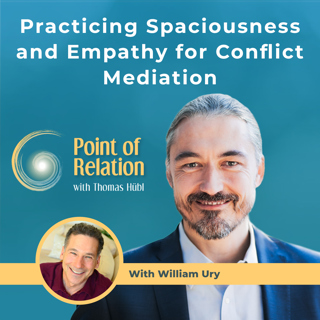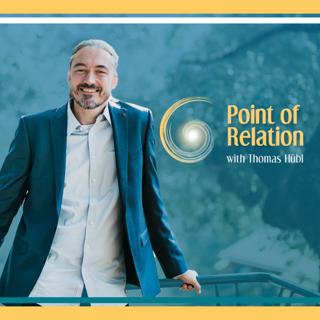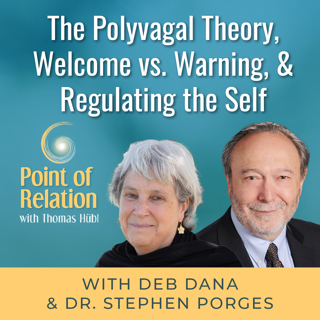
William Ury - Practicing Spaciousness and Empathy for Conflict Mediation
"The single biggest block to getting a yes in any kind of conflict is yourself,” says author and expert negotiator William Ury.In this episode, William Ury shares his expertise in demonstrating spaciousness and empathy in conflict-laden situations, mediation as an intrapersonal exercise, and dissecting trauma in an unsettled society.▶️ Practicing Spaciousness and Empathy for Conflict Mediation with William UryKey Points to Discover: ✔️ Practice the palm pinching technique. Standing in the middle of conflict can be terrifying. Step back and find perspective within by pinching your palm. “It gives you momentary pain, but it’ll keep you alert,” William Ury retells.✔️Befriend your emotions. Trauma brings about emotions we perceive as negative – such as anger, resentment, jealousy, hatred, and fear.William Ury says, “Befriend these emotions. Welcome them. Don’t judge them. Host them. Don’t suppress them.” Every emotion contains a message. If we’re open and paying attention, we can better understand it.✔️ Conflicts have three sides. The third side is called the whole – the larger community to which the two parties belong. “It’s not a conflict between individual A and individual B. It’s a collective,” he explains. This unseen side holds a huge responsibility to mediate and gather the two parties to reach a resolution.✔️ Empathy requires putting yourself in your own shoes. It’s hard to put yourself in others’ shoes when you have preconceived ideas about them.Be in a place of clarity and gather as much information as you can about the conflicts you witness. This is where real and deep empathy begins.✔️ The absent parts of ourselves are filled with the past. When we aren’t fully integrated with the painful experiences of others, it blocks us from developing genuine empathy, and we might instead find that we’re filled with fear, physical tension, and numbness. Healing from intergenerational trauma requires us to feel the fears of our ancestors – merging them into our present flow. This allows us to cultivate greater empathy for the people in our lives.✔️ Mediation means seeing a way forward. Finding the way forward in conflict calls for inner spaciousness. As a mediator, William Ury recommends taking a step back and viewing the situation from what he calls “going to the balcony” - a removed position from which we can be more present, empathetic, and objective. Take off the blinders of your own biases and see the larger picture.---------------William Ury is one of the world’s leading experts on negotiation and mediation. As the co-founder of the Program on Negotiation, he is a driving force behind many new negotiation theories and practices. Ury is the co-author with Roger Fisher and Bruce Patton of Getting to Yes, a 15-million-copy bestseller translated into more than 35 languages, and the author of several other books including the award-winning Getting to Yes with Yourself.Over the last four decades, Ury has served as a negotiation advisor and mediator in conflicts ranging from the Cold War to ethnic and civil wars in the Middle East, Chechnya, Yugoslavia, and most recently in Colombia, where he serves as a senior advisor to President Juan Manuel Santos. In addition to teaching negotiation and mediation to tens of thousands of executives, Ury is the founder of the Abraham Path Initiative, which seeks to bring people together across cultures by opening a long-distance walking route in the Middle East that retraces the footsteps of Abraham and his family. In recognition of his work, he has received the Cloke-Millen Peacemaker Award, the Whitney North Seymour Award from the American Arbitration Association, and the Distinguished Service Medal from the Russian...
21 Helmi 202358min

An Invitation from Thomas Huebl
We are incredibly excited to launch our new podcast – 𝐏𝐎𝐈𝐍𝐓 𝐎𝐅 𝐑𝐄𝐋𝐀𝐓𝐈𝐎𝐍. In these episodes, Global Healing Facilitator Thomas Huebl aims to explore the ancient and contemporary topics melding in the zeitgeist of our time and find the sweet spot of our relational experience. ✴ Here is a space we behold and can bravely explore the boundaries of that which we already know. ✴ Here is where we can learn more about how our lives intersect with the future and observe the convergence of the conscious and unconscious realms. ✴ Here is where we enter an expanded territory coming into a place of freshness, innovation, and inspiration.By doing this together, through the episodes of this podcast, we can find a greater understanding of life and take away learning that we may not have even known we wanted or needed. Ultimately, Thomas aims to leave us each feeling uplifted, energized, connected, and creative.🎙️ https://pointofrelationpodcast.com/ #Transformation #Abundance #Scarcity————————————————————————————————Thomas Hübl is a renowned teacher, author, and international facilitator whose lifelong work integrates the core insights of the great wisdom traditions with the discoveries of science. The focus of his work is collective trauma and global healing. Webpage: https://thomashuebl.com/Facebook: https://www.facebook.com/Thomas.Huebl.SanghaLinkedIn: https://www.linkedin.com/in/thomashuebl/Instagram: https://www.instagram.com/thomashuebl/Youtube: https://www.youtube.com/thomashueblTwitter: https://twitter.com/thomasHuebl "Healing Collective Trauma" is an award winning book by Thomas, published in five languages. https://www.collectivetraumabook.comMentioned in this episode:Pulling the Thread Ad
20 Helmi 20236min






















